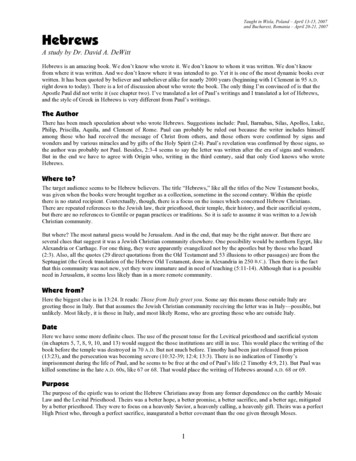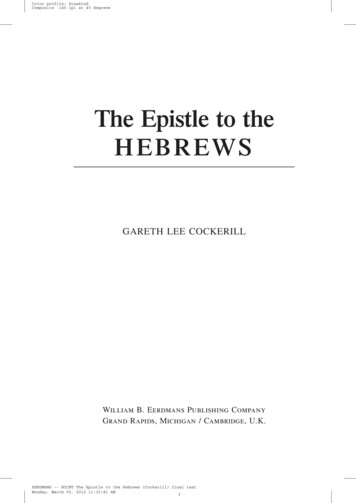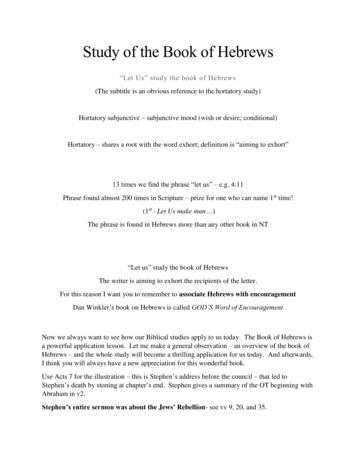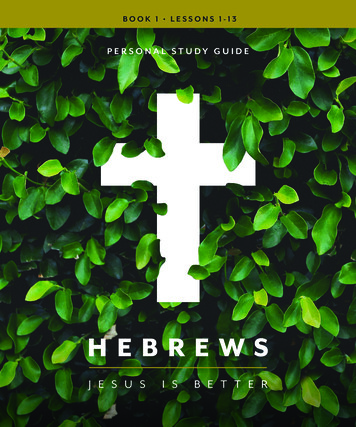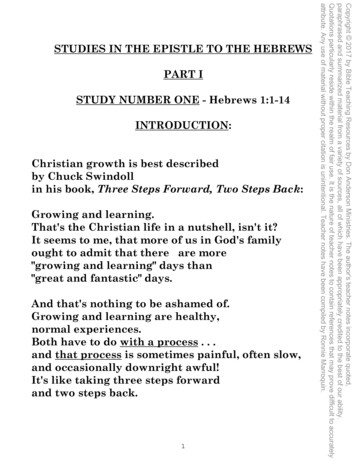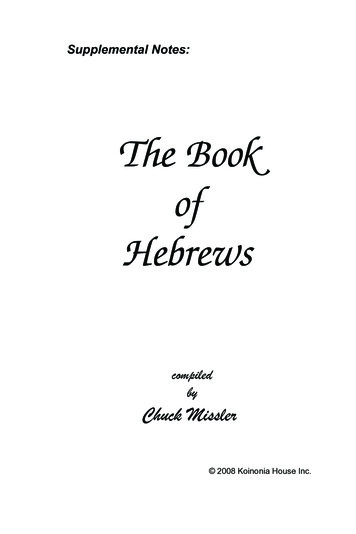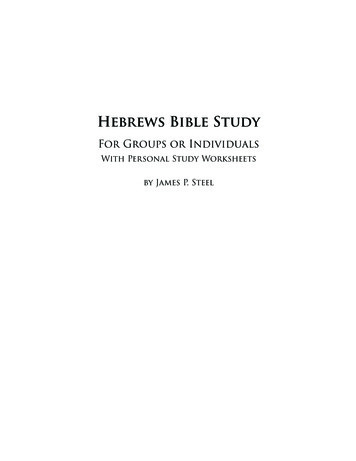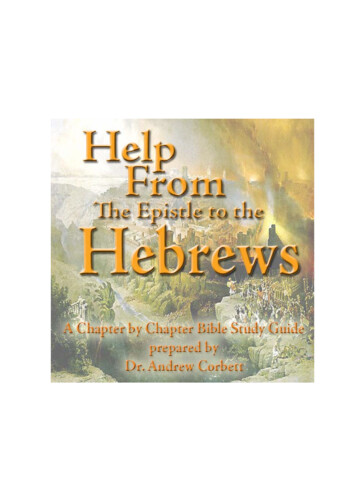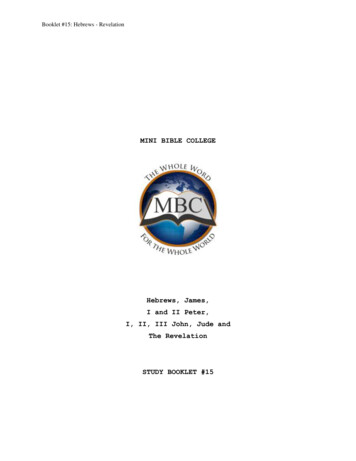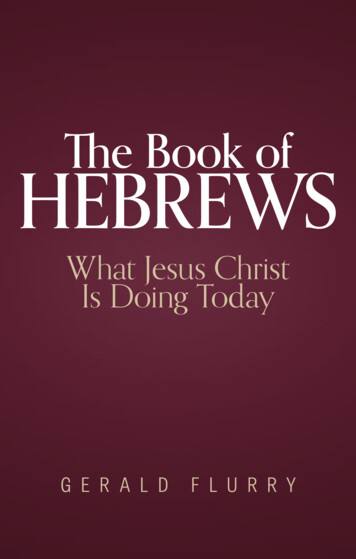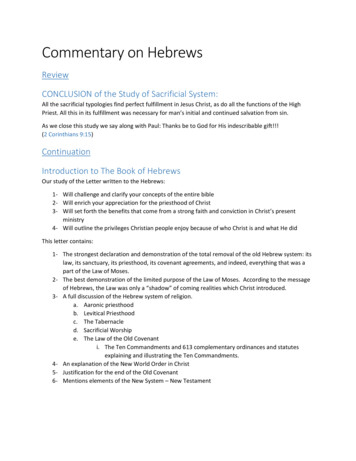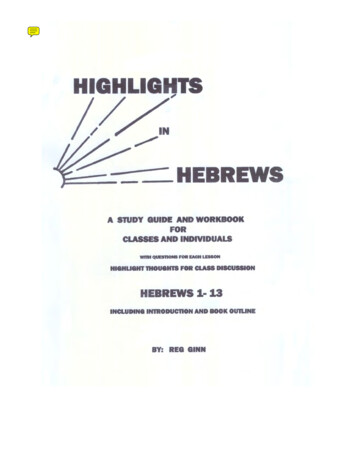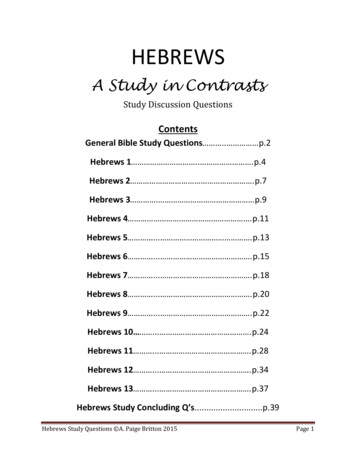
Transcription
HEBREWSA Study in ContrastsStudy Discussion QuestionsContentsGeneral Bible Study Questions . p.2Hebrews 1 . .p.4Hebrews 2 .p.7Hebrews 3 . p.9Hebrews 4 .p.11Hebrews 5 . .p.13Hebrews 6 . .p.15Hebrews 7 . .p.18Hebrews 8 . .p.20Hebrews 9 . .p.22Hebrews 10 . .p.24Hebrews 11 . .p.28Hebrews 12 . .p.34Hebrews 13 . .p.37Hebrews Study Concluding Q’s.p.39Hebrews Study Questions A. Paige Britton 2015Page 1
General Bible Study Questions Why is it helpful to branch out to another translation sometimes? When would it be helpful to know the Greek behind our English translations?o How could you find this out? Why do people sometimes come up with different interpretations of the sametext? What should we do when we disagree about the interpretation of a text? What genres of literature are in the Bible?o Why is it important to correctly identify the genre of a book or passage?What would be the result if we mistook one type of writing for another? What parts of your Bible are NOT inspired? (As review:)o What is the difference between indicatives and imperatives?o Suggestion: offer some passages to evaluate. Use these follow-up Q’s: Indicatives: Can I learn anything from this about what pleases God? Imperatives: To whom is this command addressed? Why would a NT author quote an OT passage or verse? How does the OT point to Jesus? Consider words that we direct to others: what are these words FOR? What’s theirpurpose? (it’s helpful to list all the different verbal actions that we use words for –e.g., giving or getting info., rebuking, warning, inviting, commanding, etc. – becauseyou’ll want to be alert for how the author changes from one mode to another. When have you ever taken time and labor to understand something in the Bible orin the faith, where you felt it was really WORK?o What do we gain by putting in the work?Hebrews Study Questions A. Paige Britton 2015Page 2
Continuity & Discontinuity:o From OT to NT: In what ways do they say the same thing? (continuity) In what ways do they speak of something different? (discontinuity)o From this world to New Heavens & New Earth – what stays the same?What will change?Hebrews Study Questions A. Paige Britton 2015Page 3
Hebrews 1Questions can be used for initial study or for review. Hebrews in Generalo From your previous reading of Hebrews, what words or ideas do you alreadyexpect to encounter in the text?o What words or feelings do you already associate with the book?o Do you already have any favorite verses from this book? Hebrews 1:1-4o What is the initial contrast introduced here?o What was true in the past?o What were some of the “various ways” that God used to communicate?o What was God saying in these “various ways”?o What is true in the present?o How is this different? How is it an improvement?o How is Jesus superior to the earlier forms of communication?o What do we learn about God here, incidentally? (that he communicates! Specialv. general revelation here!)o What has God communicated through Jesus?o To anticipate as we read Hebrews: How did the old channels communicate Jesus? What is the new message? How is it different?o (v.2 – heir, creator) What does Jesus inherit? When does this happen? (now? Not-yet?) What does this statement imply about the Son? What words do you think of that describe the material creation? Do you know of any other verses where the Son is said to have beeninvolved in Creation?o (v.3) In what ways is Christ described here as being the SAME as God? Can you think of any other biblical references to God or Jesus beingLIGHT? Powerful word – can you think of any times in the Gospels when Jesusperformed a miracle simply by SPEAKING?Hebrews Study Questions A. Paige Britton 2015Page 4
Hebrews 1, cont’d What could the Son do because he was incarnate (made human)?What did Jesus finish or accomplish, according to these verses?What does the phrase “purification for sins” assume about humanbeings?What happened AFTER the cleansing was accomplished?What is significant about the Son being seated “at the right hand”?What is significant about “a more excellent name”? Hebrews 1:5-14 – “The String of Pearls”o For what purpose is the author launching into this string of OT quotations?o (v.5a) Psalm 2 – What relationship is stressed here? In what ways do we see this relationship confirmed in the Gospels?o (v.5b) 2 Sam. 7:11b-16 What part of Israel’s history is told in 2 Sam.? What is the gist of this passage? In what ways is Jesus connected with David?o (v.6) Deut. 32:43 What part of Israel’s history is told in Deut.? What questions occur to you, reading Heb. 6 & Deut 32:43? (This will require some research on your part!) What is the gist of Deut. 32? (skim it!) How does this quotation support our author’s purpose in this section?o (v.7) Psalm 104:4 What is the gist of this psalm? How does this quotation serve the author’s purpose?o (v.8-9) Ps. 45:6-7 What is the gist of this psalm? What theme that we’ve noted previously is reinforced here? How does this quotation serve the author’s purpose?o (v.10-12) Ps. 102:25-27 What is the gist of this psalm? What theme that we’ve noted previously is reinforced here? How does this quotation serve the author’s purpose?Hebrews Study Questions A. Paige Britton 2015Page 5
Hebrews 1, cont’do (v.13) Ps. 110:1 What is the gist of this psalm? Where have we seen the “right hand” before in Hebrews?o v.14 – Chart to fill out together:AngelsJesusPositionNatureRoleHebrews Study Questions A. Paige Britton 2015Page 6
Hebrews 2Questions can be used for initial study or for review. Connecting back:o What has the author said so far about the Son before his incarnation?o What has been said so far about his incarnation?o What has been said about his exaltation? What’s involved in this part of thestory? Heb. 2:1-4o What command is given here?o What reason is given for this command?o What does the author mean by “what we have heard”? Are there any cluesdefining it here? Where did it come from?o What two things are being compared here? (2 messages)o What detail has you scratching your head? How might you research this? (you need to do some significant homework here!)o Did you notice the warning? What’s the danger here?o What theological puzzle does this raise in our minds (whether or not the authoris concerned about this himself)? How do we reconcile this message with the doctrine of “eternalsecurity,” or the “perseverance” or “preservation” of the saints?o What do we know of the church, and of human nature, that would make thewarning valid and yet preserve the idea that a true believer can never be kickedout of the family? Wheat & tares, Mt. 13:24-30 1 John 2:19 – some are “not of us” Fair to ask a group of Christians to test themselves (2 Cor. 13:5a; 1 John) The wise listen to rebukes (Prov. 25:12)o How might the warning have applied to its original hearers?o How may we apply it today? Heb. 2:5-9 – Midrash on Psalm 8o What point does our author seem to be making about Jesus?o How does this quotation from Psalm 8 reinforce his theme?o Read Ps. 8 – What was it originally talking about? In what ways is it appropriately applied to Jesus?Hebrews Study Questions A. Paige Britton 2015Page 7
Hebrews 2, cont’do What does “taste death for everyone” mean? Are there any limits on “everyone”? Hebrews 2:10-18 – Solidarityo Who is the active subject of v.10?o What statement is puzzling here? (“made perfect”) What would it mean in OUR case? What CAN it mean in Jesus’ case?o What form of writing do you see in vv.12-13? What’s the purpose of it? (seeend of v.11 for a clue) How does each statement reinforce this idea of Christ’s solidarity oridentification with his people?o (v.11) What is the common heritage between Jesus and his brothers?o (vv.14-18) What has been accomplished through Jesus’ solidarity with hisbrothers and sisters?o Why has death always been a fearful thing for human beings? In the face of death, what coping mechanisms did people have inancient times? How about in the present day?o What has happened through Christ that takes the sting from death? Why did a death disarm the devil? In what sense did the devil “hold the power of death”?o (v.16) What is our connection with Abraham? In which letters does Paul especially elaborate on this?o (v.18) What does this solidarity accomplish for us now, in the present moment? What kind of help would we be needing? How was Jesus “tempted”?Hebrews Study Questions A. Paige Britton 2015Page 8
Hebrews 3Questions can be used for initial study or for review. Hebrews 3:1-6o What ideas are introduced here for the first time?o Were there any connector words joining this section with the previous passage?o What is the author doing with his words in this paragraph? (comparing,commanding)o What could we say is the main idea expressed in this paragraph?o What comparisons are being made between Moses and Christ? How is Jesus LIKE Moses? How is he GREATER THAN Moses?o What could be meant by “house”?o What is the OT story referred to here? How is this relevant to the Hebrews’present situation?o What is the imperative here?o What was the imperative in ch. 2? How are they related?o What is Jesus called? How is this like Moses?o Why “apostle”? What does this bring to mind? (teacher, prophet, speaker ofwords, appointed messenger, authority)o (3:6) – implied warning: “if indeed we hold fast” Why was this conditional statement necessary for the original readers? How might it apply to people in the church today?o What questions does this paragraph raise in your mind? Hebrews 3:7-19 – Psalm 95o Psalm 95: What’s familiar? What are the two moods of the Psalm? When was it written? What past event does it refer to?o What is meant by “rest” here? (possibilities?)o What words from this section describe unbelief? What is it characterized by?o Read Num. 13:31-14:4 What is implied here about the people’s belief about God? What is thewrong content in their minds?o In the book of Hebrews so far, what kinds of wrong notions has the author likelybeen addressing?Hebrews Study Questions A. Paige Britton 2015Page 9
Hebrews 3, cont’do Read Num. 14:7-9. What is the right content that Joshua is trying to remind the Israelitesabout?o What is the right content that the author to the Hebrews has been reminding hisaudience of?o Read Luke 8:11-15 (parable of sower; Jesus’ teaching on unbelief) What circumstances mentioned here are likely to derail a God-centeredversion of reality? What wrong views creep in because of the devil? .testing? .cares?.riches? .pleasures? What characterizes the life of faith?o Heb. 3:12-14 – looking out for one another Who in the church has oversight for the beliefs of the believers? What must the elders be alert for, among the people in their care? What does this kind of daily encouragement or exhortation towardsright thinking look like in your life, whether you are the exhorted or theexhorter?Hebrews Study Questions A. Paige Britton 2015Page 10
Hebrews 4Questions can be used for initial study or for review. Hebrews 4:1-11o What new ideas are present here?o What is confusing?o What seems to be the writer’s main concern?o How does verse 1 compare with v.11? Just from these two verses, what is the author’s concern?o On Psalm 95 What OT incident was Ps. 95 referring to? What characterized the unbelief of the wilderness generation? Who offered a believing perspective by contrast, and what was it? Why did our author bring up Ps. 95 in the first place? Three parts to the midrash: Quotation of the Psalm (3:7-11) Negative application – DON’T do that (3:12-19) Positive application – DO do this (4:1-11)o (v.1) What indicative statement is made here?o (vv.4-8) What three biblical time periods are mentioned here?o What does the reference to Gen. 2:2 imply about how long this rest has beenaround, and what is the nature of it?o In what way are we to understand God to have “rested” after his work ofcreation? (not inactivity, but a ceasing from a particular task; cf. John 5:17)o Why mention Joshua?o Why mention David?o (v.9) When you hear “Sabbath rest,” what do you think of? WHEN is this to occur? (ambiguous – what are the possibilities?)o (v.11) What commands and helps has our author given so far, that we may carrythis out? Hebrews 4:12-16o What is your understanding of v.12?o What do soul/spirit, joints/marrow, and thoughts & intentions of the heart havein common? (they are all secrets!)o What secret needs to be discovered by the living and active word of God? (thesecret of belief or unbelief!)o Where else have we seen the heart mentioned in Hebrews?Hebrews Study Questions A. Paige Britton 2015Page 11
Hebrews 4, cont’do What is troubling about v.12 for a believer?o What could “word of God” refer to? How is God’s word being used in 3:7-11? For what purpose? How is God’s word (generally) already shown to be “living and active”in Hebrews?o (v.13) The watchful eye of God – Does this sound like good news or bad? What emotions does this verse inspire? What need does it evoke? Where else in Scripture do we find God’s watchfulness?o (v.14-16) Can you find any links with what has gone before? (Words, phrases,concepts) What are the main ideas about Christ here?Hebrews Study Questions A. Paige Britton 2015Page 12
Hebrews 5Questions can be used for initial study or for review. Hebrews 5:1-4 – the Back Storyo What historical link is introduced here?o Where is this told about in the OT? (Ex. 28:1; Ex. 29:9b)o What is stressed here about the human high priest’s role?o What expectations or qualifications are noted for this office?o Why is Aaron mentioned here?o What similarities do you observe between the human high priest and Christ?o What contrasts have already been brought out? Hebrews 5:5-10 – Christ’s Priesthood (Jesus’ Resume)o What jumps out at you in this section? What would you like to talk about?o Where have you seen the first quotation before?o What is similar between these verses? (someone is being appointed to a title &office)o Who is Jesus, according to God’s appointment?o What new historical figure is introduced? Where does he figure in the OT story, and whose story does heintersect? What similarities are implied here between Jesus and Melchizedek? Hebrews 5:11-14 – Marks of Maturity/Immaturityo What is the tone here? How would you summarize the author’s message in thisparagraph?o What is the congregation chided for here?o List the characteristics of someone who is “immature” and of someone who is“mature.”o What are the three marks of maturity given here? (able to handle more difficultmaterial; able to teach; able to discern)o What went wrong with them? (note the verb “become”! This is a change in state– it doesn’t have to do with intellectual ability, which does not change.)o What is the root of the problem here? Is it that they had poor teachers? (cf. 2:34; they are one generation removed from the eyewitnesses and Jesus!)o What is implied here about the learners?o What can interfere with our learning?o When are students blameworthy for their ignorance?Hebrews Study Questions A. Paige Britton 2015Page 13
Hebrews 5, cont’do When are ignorant students NOT blameworthy?o When is “milk” appropriate for a learner?o What specific wrong thinking would have threatened the learners’ receptivity inthe original setting?o What are the author’s intentions in this letter?o If maturity comes to those whose powers of discernment have been “trained byconstant practice,” what ideas or images does this bring to mind?o Why is this section very easy to apply directly to US? What is the knee-jerk take-away message that you get here? Let’s say a pastor had to preach this. What legitimate applicationCOULD he land on? What CAN it mean (for us)? What CAN’T it mean? Should we seek a DIRECT or an INDIRECT application? (Note that the author does not know US – so these very specific things heis saying apply directly only to the people he does know!) Do our hearts ever resist the teachings of the faith, where weencounter the gospel’s demands on our lives? Give examples.o What are these listeners truly blameworthy for, regarding their learning? Whatphrase captures it?o Making progress towards maturity here has to do with understanding how Jesusfulfills and replaces an OLD way with something NEW. Why would this be EXCITING information for Jewish Christians? Why would this be SCARY for these same people? (This is an emotional moment! It’s a point of crisis that identifies the riftbetween believers and unbelievers. Should they go forward in Christ, orback to Judaism?)Hebrews Study Questions A. Paige Britton 2015Page 14
Hebrews 6Questions can be used for initial study or for review. Hebrews 6:1-8 – The Warningo (vv.1-3) How are each of these basic things related to Christ?o Why might the people cling to and not wish to progress past these elementarythings?o (vv.4-6) Why do Christians get nervous about this passage? How do people try to resolve the tension?o What investment, expectation, and results are being illustrated by theagricultural metaphor in these verses? Read Isaiah 5:1-7 Who is Isaiah talking about? (Locate in redemptive history) What had been invested? What was expected? What were theresults? Recall (or summarize) Numbers 13-14; Psalm 95 What had been invested in these people? What was expected? What were the results? Read John 15:1-6 Who is Jesus talking about? What has been invested? What is expected? What will be the consequences for different results? What is the same in ALL OF THE ABOVE parallel passages? (a group ofGod’s people, in whom God invests, does not live up to expectations –God reaps the harvest and judges those who DID NOT ACTUALLYBELIEVE. Fruitlessness is the result of a lack of genuine relationship tothe vine/vinedresser.) Hebrews 6:9-12 – Positive Hopeso How is the author’s personal knowledge of this congregation evident here?o The gospel – though GOOD NEWS! – has its sharp edges, closed doors, anddeadlines; yet it is comforting, open, and eternal for those who receive it with anoble and good heart. Can you recall what we’ve heard in Hebrews already ofthese two sides of the gospel (sternness and grace)? (make a list together)Hebrews Study Questions A. Paige Britton 2015Page 15
Hebrews 6, cont’d Hebrews 6:13-20 – Abraham, Oaths & Promiseso This is a “hinge” paragraph, transitioning back to the argument that the authorinterrupted with his personal rebuke & exhortation. Do you remember what hehad been talking about previously?o What pronouns did you hear in vv.13-20? (we, our) How wide is the “we” here? Do you think it just refers to those people“back then,” the original writer and readers of Hebrews? Or is this trueof all believers at all times – including us? What clues do you have tosupport your answer?o Oath: guarantees that the promise will happen.o Promise: the content; what the promise intends to do. Read Gen. 22:15-18 Which part is the oath? Which is the promise? Read Ps. 110:4 Which part is the oath? Which part is the promise?o (Review Q:) What is the difference between oaths and promises?o What has the author directed his readers to do in v.12?o Will his readers be concerned with the SAME promises as Abraham was?o (v.16) (a reference to experience with oaths in the ancient world) Is this attitude toward oaths the same today? Or are we moreskeptical now? (There may be a cultural divide here that interferes withour impression of the FIRMNESS described by the author when hementions God’s oath and uses the analogy of human oaths.) If I were trying to communicate something to you about my ownintegrity, is there anything that I could say or do to remove all doubt inyour mind? (e.g., in a legal setting – there would be the possibility oflitigation and risk of livelihood if I broke a promise or lied; contracts;notary; sign your pledge that this is true; etc.)o (vv.17-18) Who are the heirs to the promise? What is Paul’s argument about believers being heirs to Abraham andthe promises? Where does he make it? Which promises is our author concerned with? (high priest forever &order of Melchizedek)Hebrews Study Questions A. Paige Britton 2015Page 16
Hebrews 6, cont’d (Review Q:) What is the specific oath-bound promise that the author tothe Hebrews wants to reinforce? (see 6:20)What is the significance of this promise, if it’s true?o (vv.19-20) What has Jesus done for us? What are the results? What is said to be “the anchor of our hope”?Hebrews Study Questions A. Paige Britton 2015Page 17
Hebrews 7Questions can be used for initial study or for review. Heb. 7:1-3 – Melchizedek’s similarity to the Sono Read Gen. 14:18-20 What do you notice? What more do you want to ask?o Read Heb. 7:1-3 What do you get from a straightforward, literal reading? Why is this problematic? (Do your homework here!) What similarity is the author trying to bring out? Notes: Literarily speaking, Melchizedek is like the Son in having aunique, unending, unrestricted priesthood. Jesus fulfills thesethings in an unqualified way, while Melchizedek (through theHoly Spirit’s limited description of him in Gen. 14) illustrates thesecharacteristics in a literary way.o What is special and different about Melchizedek? Heb. 7:4-10 – Melchizedek’s superiority to the Levitical priestso What does Abraham communicate about rank by tithing to Melchizedek?o What does Melchizedek communicate about rank by blessing Abraham?o How does our author emphasize Abraham’s high dignity (and therefore increaseMelchizedek’s dignity in our eyes)? Heb. 7:11-19 – Logical implications of the Melchizedekian Ordero “perfection” – What does this say about God’s intention for the Leviticalpriesthood?o What do you know about Paul’s arguments about the Law and its purpose? How do his arguments complement what we read here in Hebrews?o In what ways is Jesus a DIFFERENT priest? (several!)o (v.16) “Indestructable life” What does this phrase suggest to you? What do you think our author is referring to here?o (v.18-19) Why was the Law “weak and useless”?o Why is ours a better hope? Heb. 7:20-25 – Oaths about Forevero Why were oaths important to the author already? (see Ch. 6)Hebrews Study Questions A. Paige Britton 2015Page 18
Hebrews 7, cont’do What’s different about the Psalm 110 quotation this time? Why did the author cut it off where he did?o “Better covenant” What is in the “better covenant”? What good things can you name from Hebrews so far? How is this covenant fixed and guaranteed?o Many priests v. One priest What contrast is being drawn here between the Levitical priesthoodand Jesus’ priesthood? Where have we seen the pattern of “many” and “one” before?o “save to the uttermost” – What does this phrase bring to mind?o “he always lives to make intercession” – what does this bring to mind? What isJesus doing?o What is the “fittingness” that is described in v.26? What makes Jesus ‘fit’ to beour high priest?o What is emphasized about Jesus’ character here? What significance do these words have?o What contrasts are reiterated here between the human priests and Jesus thegreat high priest?o How are WE involved in this paragraph? How does it relate to us?o What’s our relationship to this high priest?o Where is he presently located?o What details about the earthly priesthood are mentioned?o How does his priesthood compare with the earthly one?Hebrews Study Questions A. Paige Britton 2015Page 19
Hebrews 8Questions can be used for initial study or for review. Chapter 8 Overviewo (read whole chapter:) What were the main topics in this chapter?o What idea is being conveyed about each of these main topics?o What hints are given here that the heavenly tabernacle is superior to the earthlyone?o What evidence is given here that the new covenant was to be superior to theold?o What are the uses of the OT here? Exodus: What’s the author’s purpose with this quote? Jeremiah: What’s the purpose? Hebrews 8:1-6 – Sanctuarieso What is different about the heavenly sanctuary?o What do we learn about the earthly one?o What priestly work happens in the heavenly sanctuary?o What’s going on here? What is this section saying about reality itself?o Where else in Scripture do we get heavenly realms breaking into the earthly?o What did Moses see and copy? (What can we say for sure about it?)o What continuity (sameness) do we see between the Earthly tabernacle and theHeavenly one?o What discontinuity (difference) do we see between them?o What difference would there be in their PURPOSES?o What is our high priest doing (and NOT doing) now? Hebrews 8:7-13 – New Covenanto Where did this quoted passage and its human writer originally fall on theredemptive-historical timeline?o What other parts of the timeline does it refer to? Looking BACK Looking FORWARDo What questions come to your mind after reading this section?o Who/what was found faulty? (manuscript difference – do your homework!) What are the two possibilities? (vv.7, 8)Hebrews Study Questions A. Paige Britton 2015Page 20
Hebrews 8, cont’d oooooCan you think of other verses that we’ve read in Hebrews thatsuggested that there has been a significant change, even areplacement of the Law? Can you think of verses that suggest the people were at fault?What makes the New Covenant better? What elements do you see the prophetic passage celebrating?What is the continuity and discontinuity here?Has the New Covenant arrived? What does the author think? What parts of the timeline COULD this passage be about? Could it be about more than one? What would be the “Now” and the“Not yet” of each of these elements of the New Covenant (consideredabove)? What does our author think? What indications do we have so far that the forgiveness Jesus achievedis complete?What about “not needing teachers”? What could this mean? What is problematic about this prophetic statement? Can you point to evidence in the NT & in Hebrews itself that TEACHERSwere still part of God’s plan for his church? What could be the “now” and the “not-yet” of the fulfillment of thisprophecy?Where are the terms of the New Covenant spelled out? What parallels do we see between the Old Covenant and the New? Where do you find guidelines for life under the New Covenant? Giveexamples.Hebrews Study Questions A. Paige Britton 2015Page 21
Hebrews 9Questions can be used for initial study or for review. Review:o What do we know so far about Christ’s priesthood, and what does it have to dowith us?o Read 8:8b-12 and list key word relating to the New Covenant. Hebrews 9:1-5 – Old Covenant Nounso What is the topic now?o What key words from this paragraph were also found in the discussion of theNew Covenant?o What do you know about Aaron’s staff? (see Num. 17)o What Old Covenant Nouns are named here? (do your homework on these – how do they each point forward toChrist?) Hebrews 9:6-10 – Old Covenant Verbso What is the topic now?o What Old Covenant verbs are used here?o What is the significance of the blood?o What is anticipated by the Old Covenant objects, places, and rituals?o What were the limitations of the Old Covenant?o What ages or epochs are named here? (see vv.8-10) Hebrews 9:11-14 – New Covenant Mediator and Sacrificeo What is already true for us in Christ?o What is yet to come?o What contrasts are brought out here?o What kind or degree of effectiveness was present in the Old Covenant sacrifices?o What are we saved FROM?o What are we saved FOR?o What is gained by the once-for-all sacrifice?o Where is this goal of salvation also taught in the New Testament?o How is the Trinity involved in Jesus’ sacrifice?o If we didn’t have the background knowledge already, what would we have tofigure out in order to understand and begin to appreciate the significance of thissection (9:1-14)?Hebrews Study Questions A. Paige Britton 2015Page 22
Hebrews 9, cont’do Can you explain any of the nouns or rituals that are mentioned here?o What does the Day of Atonement ceremony point to? Hebrews 9:15-22 – An Old Covenant Pictureo (v.15) – Mediator: Where have we encountered this designation before?o Where did we see a Moses-Jesus comparison before?o What role do we see Moses playing in this OT picture?o How is DEATH woven into this paragraph?o WHEN do these things occur? What occurred in the ongoing historical past? What acts are already accomplished and done? What are the ongoing realities? What is the present condition of believers? What is our future hope?o Where does Ex. 24 fall in the storyline of Israel?o What’s the point of showing this OT snapshot? (compare with Heb. 9:23-28) What’s the gain for us? Hebrews 9:23-29 – the Contrast of Christo How is Christ’s priestly action different?o How might the Reformers have used v.26 as a counterargument to the CatholicMass?o What “Whens” (epochs) are mentioned here?o In what ways did the Old Covenant sacrifices resemble the bloody sacrifices ofthe pagan religions in that age?o What is significantly different about the Jewish sacrifices? (prescribed by law;significance is revealed; personal relationship with Lawgiver)o What was the MEANING of the Jewish animal sacrifices?o Where do you see yourself in this passage?o What background information helps you understand and resonate with thissection? Could a brand new believer with no prior knowledge identify withthese same things? What would they have to get straight before this part makes any senseto them?o (v.23) Why did the heavenly things need cleansing? (What possible answers can you think of?)Hebrews Study Questions A. Paige Br
Hebrews Study Questions A. Paige Britton 2015 Page 2 General Bible Study Questions Why is it helpful to branch out to another translation sometimes? When would it be helpful to know the Greek behind our English translations? o How could you find this out? Why do people sometimes come up with different interpretatio
